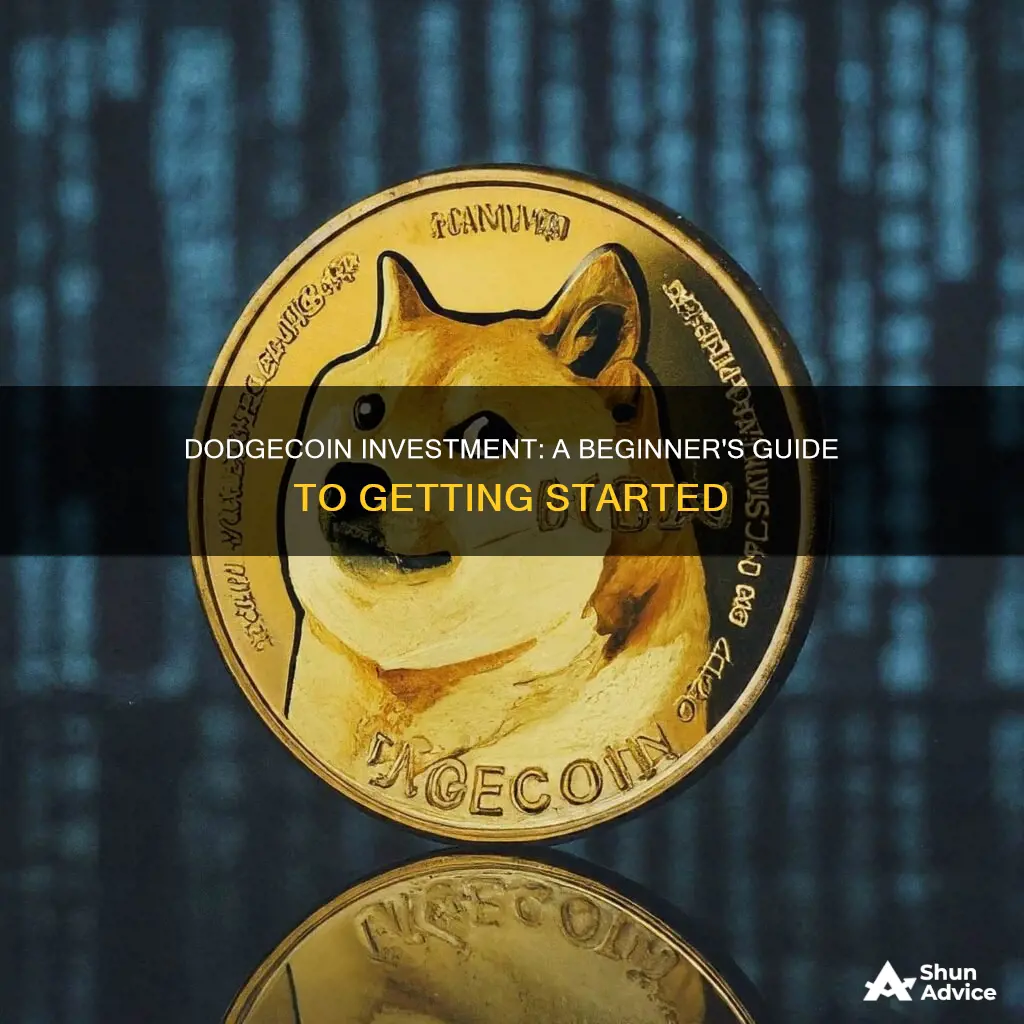
Dogecoin is a cryptocurrency that was created as a joke based on a popular internet meme of a Shiba Inu dog. Despite its lighthearted origins, Dogecoin has gained a devoted community and surged in value, making it an attractive investment option for some. However, it is important to note that Dogecoin is highly volatile and subject to extreme fluctuations in value.
If you are considering investing in Dogecoin, there are several steps you should take. First, evaluate your financial situation and risk tolerance to determine how much you can afford to invest. Remember that cryptocurrency is a risky investment, and it is generally recommended to invest no more than 3% to 10% of your portfolio in cryptocurrencies.
Next, you will need to find a cryptocurrency exchange or trading platform that offers Dogecoin, such as Coinbase, Kraken, or Binance. These platforms allow you to buy, sell, and trade Dogecoin and other cryptocurrencies. When choosing an exchange, consider factors such as security, fees, the number of supported cryptocurrencies, and the quality of their crypto wallet.
Once you have selected an exchange, you will need to create an account and deposit funds into your account, either through a bank transfer, debit card, or other supported payment methods. Then, you can place your order for Dogecoin by specifying the amount you wish to invest or the number of Dogecoins you want to purchase.
Finally, consider your storage options. By default, your Dogecoin will be stored in the crypto wallet provided by the exchange or brokerage platform. However, for added security, you may want to transfer your Dogecoin to a separate crypto wallet, either a hot wallet that is connected to the internet or a cold wallet that is a physical hardware device.
| Characteristics | Values |
|---|---|
| Current Price | $0.0959 per DOGE |
| 24-Hour Trading Volume | $998.95M |
| Price Movement in the Last Hour | Decreased by 0.28% |
| Price Movement in the Last 24 Hours | Decreased by 0.19% |
| Price Movement in the Past Week | Decreased by 21.80% |
| All-Time High | $0.74 |
| Current Circulating Supply | 145,441,906,383.705 DOGE |
| Market Capitalization Ranking on Coinbase's Centralized Exchange | #10 |
| Cost of 1 Dogecoin | $0.10 |
| Payment Methods | Bank account, debit card, wire transfer, PayPal, gift card |
| Supported Countries | United States |
What You'll Learn

Choosing a wallet
When it comes to choosing a Dogecoin wallet, there are a few different options available to you. Firstly, it's important to understand the difference between a hot wallet and a cold wallet. A hot wallet is always connected to the internet, whereas a cold wallet is not. Hot wallets are typically software-based and can be accessed from anywhere, making them a convenient choice for those who need to access their funds regularly. Examples of hot wallets include mobile apps, browser extensions, and downloadable software. Cold wallets, on the other hand, are typically hardware devices that store your crypto offline, providing an extra layer of security. Examples include hardware wallets and paper wallets.
When choosing a Dogecoin wallet, there are several factors you should consider:
- Security: How secure is the wallet? Does it offer features such as two-factor authentication or multi-signature functionality?
- Ease of use: Is the wallet user-friendly and easy to navigate? This is especially important if you're new to cryptocurrency.
- Backup and restore options: Can you easily back up and restore your wallet if needed?
- Ongoing development: Is the wallet regularly updated with new features and improvements?
- Customer support: How easy is it to get in touch with customer support if you have an issue?
- Reviews: What do other users think of the wallet? Are there any common issues or complaints?
- Ledger Nano X: One of the most popular cold wallets on the market, offering a high level of security and supporting over 5500 cryptocurrencies.
- Trezor Model T: A top-notch cold wallet with excellent security features and a touchscreen interface. It supports over 1000 crypto assets.
- Ledger Nano S Plus: A beginner-friendly hardware wallet that's small and discreet. It supports over 5500 assets and can be managed from a mobile device.
- Trezor One: An older version of the Trezor Model T, still offering excellent security features and supporting a wide range of cryptocurrencies.
- KeepKey: A secure hardware wallet that utilizes a random PIN code generator to prevent keylogging. It supports over 7000 crypto assets.
- Binance: A well-known crypto exchange platform that also offers a hot wallet for Dogecoin storage. It provides a wide range of trading pairs and is very secure.
- Kraken: Another secure crypto exchange platform that doubles as a free online Dogecoin wallet. It accepts a good number of fiat currencies.
Forth Coin: Smart Investment or Risky Business?
You may want to see also

Selecting an exchange
Reputation and Security:
Look for well-established and reputable exchanges, such as Coinbase, Binance, or Kraken. These platforms have a large user base and have implemented robust security measures to protect your investments. Check for features like two-factor authentication and encryption protocols that enhance the security of your account and assets.
Availability of Dogecoin:
Ensure that the exchange you choose offers Dogecoin (DOGE). While Dogecoin is one of the more popular cryptocurrencies, it is not available on all platforms. Confirm that the exchange allows you to buy, sell, and trade Dogecoin before signing up.
Payment Options:
Consider the payment methods accepted by the exchange. Most exchanges support bank transfers from checking or savings accounts. Some also allow wire transfers, PayPal transfers, or even credit card payments. However, using a credit card may incur higher fees and interest rates, so it is generally not recommended for purchasing crypto.
Fees and Charges:
Different exchanges charge varying fees for trading cryptocurrencies. These fees can range from around 0.05% to 5% per trade. However, some investing apps, like Robinhood and Webull, offer commission-free crypto trades, which can help you save on trading costs.
Withdrawal and Wallet Options:
Check the exchange's policies regarding withdrawing your Dogecoin to a crypto wallet. Some investors prefer to transfer their crypto assets to a separate crypto wallet for added security and flexibility. Ensure the exchange allows you to withdraw your Dogecoin to a wallet of your choice if you intend to do so.
User Interface and Functionality:
Consider the user-friendliness and functionality of the exchange's platform. Look for a platform with a straightforward interface that makes it easy to navigate and execute trades. Additionally, check for mobile apps or browser extensions that allow you to manage your investments on the go.
Regulatory Compliance:
It is essential to ensure that the exchange you choose operates in compliance with regulatory frameworks. Exchanges that adhere to regulatory guidelines are more likely to provide secure and transparent services. Check for licenses, user protection measures, and partnerships with reputable financial institutions.
Customer Support:
Opt for exchanges that offer reliable customer support. As a beginner, you may encounter technical issues or have questions about the platform. Efficient and responsive customer support can help you resolve these issues promptly and make your trading experience more seamless.
Remember to do your research and compare multiple exchanges before making a decision. Carefully review their terms, conditions, and fee structures to make an informed choice.
Litecoin Investment Guide: Getting Started with Litecoin
You may want to see also

Payment methods
Once you have chosen a crypto exchange or brokerage platform to use, you will need to add a payment method to your account. In most cases, the exchanges will let you deposit money from a checking or savings account. Some platforms also accept wire transfers and PayPal transfers.
Typically, you get instant access to a portion of the money you deposit for trading. However, if you deposit a large amount of money—usually more than $1,000—you may have to wait a few days for the transfer to clear before you can use the entire deposit.
A few exchanges allow you to use a credit card to buy Dogecoin. However, before using a card to finance your crypto purchases, keep in mind that your credit card company will consider the money to be a cash advance and charge added fees and a higher APR. This can make investing in crypto even pricier and riskier. That’s why experts generally encourage people to avoid buying crypto with credit cards.
If you already own cryptocurrency, you may be able to trade some of your existing digital assets for Dogecoin. However, not all cryptocurrencies can be exchanged for Dogecoin, and each platform can be different in terms of what’s allowed. Make sure the platform you’re using allows you to pair Dogecoin with another cryptocurrency before you place a trade.
A Beginner's Guide to Investing Money via Coinbase
You may want to see also

Completing a transaction
Once you have chosen a platform and set up your account, you can start the process of buying Dogecoin.
First, you will need to deposit money into your account. The amount you deposit will depend on how much Dogecoin you want to buy, and the current market price. You can usually deposit money from a checking or savings account, and some platforms also accept wire transfers, PayPal transfers, and credit cards. However, using a credit card is generally discouraged, as the transaction will be treated as a cash advance and you will be charged additional fees and a higher APR.
Next, you can place your order for Dogecoin. On the platform's trading or purchase page, search for Dogecoin or enter its ticker symbol, DOGE. Then, specify either the dollar amount you want to spend or the number of Dogecoins you want to buy.
After you have placed your order, it should go through immediately. You will then need to finalise your purchase by confirming the transaction. Once the order is processed, you will be taken to a confirmation screen.
It is important to keep in mind that your broker or crypto exchange may charge trading fees for buying or selling cryptocurrency, which can range from about 0.05% to 5% per trade. However, some investing apps, such as Robinhood and Webull, offer commission-free crypto trades.
Investing in Next-Gen Coins: A Beginner's Guide
You may want to see also

Storing your Dogecoin
Once you've purchased Dogecoin, you'll need to store it in a secure wallet. There are several types of Dogecoin wallets available, each with its own advantages and disadvantages. Here are some of the most popular options:
Hardware Wallets
Hardware wallets are considered one of the safest options for storing cryptocurrencies like Dogecoin. These wallets store your private keys and sign transactions offline, making them more secure from malicious attacks and threats. Some popular hardware wallets for Dogecoin include:
- Ledger Nano S: This wallet offers a wide range of security features, including a built-in OLED display for transaction verification, secure PIN storage, and support for over 700 cryptocurrencies.
- Trezor One: A slightly more affordable option, the Trezor One wallet is developed by SatoshiLabs and supports over 700 tokens. It keeps your private keys secure and is trusted by millions of users.
- Ledger Nano X: An upgraded version of the Nano S, offering a touchscreen interface and support for over 5500 cryptocurrencies.
- Trezor Model T: This wallet features a touchscreen interface and supports over 1000 crypto assets. It offers top-notch security features and is highly trusted in the crypto community.
Software Wallets
Software wallets, also known as hot wallets, are convenient and easily accessible. They are typically free and can be set up quickly. Some popular software wallets for Dogecoin include:
- Exodus Wallet: A well-designed and user-friendly wallet that supports multiple platforms, including Windows, Linux, Mac, iOS, and Android. It offers a built-in exchange and supports a wide range of tokens and coins.
- Official Dogecoin Wallet: This wallet is specifically designed for Dogecoin and is available for Windows, OSX, and Linux. It offers a core wallet for downloading the entire blockchain and a lite version for storing and transferring Dogecoin.
- Guarda Wallet: A non-custodial wallet that supports over 400,000 assets. It offers an intuitive user interface and top-notch security measures, allowing you to securely store and manage your Dogecoin.
Paper Wallets
Paper wallets are a simple and secure way to store your Dogecoin. They involve printing your private keys on a piece of paper, ensuring that your coins are never connected to the internet and safe from online threats. You can generate a Dogecoin paper wallet using websites like WalletGenerator.net. However, it's important to keep the paper wallet safe and consider storing it in a safe or safe deposit box.
Online Wallets
Online wallets, also known as hot wallets, are convenient but typically less secure than hardware or paper wallets. They are constantly connected to the internet, making them more vulnerable to malicious attacks. While they may be suitable for small amounts of Dogecoin, it is recommended to use them with caution. One example of an online wallet for Dogecoin is the Dogechain Wallet.
A Beginner's Guide to Investing in APE Coin
You may want to see also
Frequently asked questions
You can buy Dogecoin on a cryptocurrency exchange like Coinbase, Binance, or Kraken, or an investment app like Robinhood, SoFi, Webull, or eToro.
Dogecoin is easier to mine than Bitcoin, and its transactions have low fees. Dogecoin also has a passionate community that has supported charitable causes and individuals.
Dogecoin is highly volatile and unpredictable. It doesn't pay dividends or interest, and there is no limit on how many Dogecoins can be mined, which could drive down the price.
Financial planners recommend investing no more than 3% to 10% of your money in highly volatile assets like cryptocurrencies. Only invest an amount you are willing to lose.
You can store Dogecoin in a crypto wallet, either a hot wallet (digital and always online) or a cold wallet (physical hardware, less susceptible to hacking).







